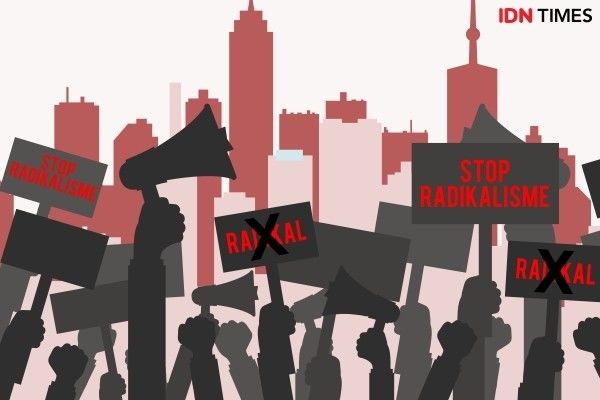What We Can Do, If Our Mosque Is Exposed To Radicalism
By: Rahmat Siregar) *
Radicalism is like a virus, where sometimes the attacks are smooth and invisible but the impact is very turbulent. Radicalism viruses have also surged in more than 500 mosques throughout Indonesia according to the State Intelligence Agency (BIN) data collection.
This was compounded by the findings of the Alvara Strategy Institute, where 39 percent of students in 15 provinces in Indonesia were interested in radicalism. There are even around 19.4 percent of civil servants who disagree with Pancasila and are more inclined to the Caliphate ideology.
The findings of the data certainly indicate an indication of radicalism in the government environment, if this is allowed then the radicalism virus will increasingly threaten the stability of the country.
Regarding mosques which are exposed to radicalism in the name of religion, a concrete solution must be sought. The weak point is the internal mosque which does not pay attention to the dynamics of religious thought and study in the mosque. In addition, some mosque administrators also follow the trend of current religious studies, without going through the process of consideration of the quality and direction of thought of the religious teachers who carry out the study.
In addition, external strength is also increasing, this is evident from the increasingly intense radicalists who map and target places of worship as a place to spread their thoughts.
The radicals will certainly be considered successful in carrying out their mission if they have succeeded in taking over the direction of the mosque movement, be it a government-owned mosque, Islamic mass organization, or a community-owned mosque.
Some NU mosques were also infiltrated by radical movements which were then used to spread radical thoughts that tended to be anti-Pancasila.
Therefore, reforms emerged in the body of Nahdlatul Ulama
to further promote the installation of the nameplate of the mosque owned by Nahdlatul Ulama and reform the mosque’s management through takmir institutions and da’wah institutions.
Prof. Abdul Munir Mulkhan also found Muhammadiyah mosques affected by infiltration of the radicalist movement so that his studies and sermons led and tended to consider other groups to be misguided.
Prof. Abdul Munir also complained about the Muhammadiyah mosque in Sendang Ayu, which was initially calm and became turbulent because his studies led to the blame for other people. The complaint was then voiced in the media belonging to the Muhammadiyah “Sendang Ayu: The Muhammadiyah struggle at the Bukit Bukit Barisan” which had been published on January 2, 2006.
The success of these radicals must certainly inspire the spirit of the community to move to dispel any thoughts that lead to the split.
In this case, every individual, especially the congregation, must understand that the quality of religion in the lecturer does not only lie in the clarity of his track record which does not create controversy, and the direction of the assessment delivered should be able to create unity and unity.
Community assertiveness to fend off radicalism in the name of religion is certainly needed. If in a study or recitation forum that leads to hatred towards the Pancasila and the NKRI, it is certainly time for people to dare to give another perspective that is no less powerful.
If you need to choose the sermon, you also need to do it selectively, so that the mosque administrators still have time to make improvements. If you find lecture material that tends to be radical, it would be nice if you also have sermon material about knitting brotherhood and patriotism.
The community can also be a control function that does not only apply to lecturers, but also to mosque administrators. This is because to prevent mosque officials who are careless in determining lectures and study material. On the other hand, mosque administrators should also be fair, which not only gives priority to preachers with a certain mindset, but also provides space for other speakers who have other perspectives.
The government also has a strong foundation to provide regulations regarding studies or sermons to be delivered. Don’t miss it again. In this case the Government must also continue to strive to restore the function of the mosque, this is because the mosque serves as a place of worship and a place to study enlightening.
Keeping the mosque from the radicalist movement is the role of the whole community. Don’t just because of the sermon once, then the unity of the congregation becomes tenuous.
) * The author is a Musholla administrator in West Java
